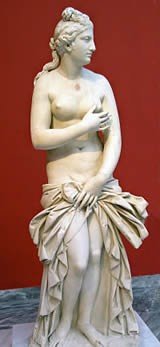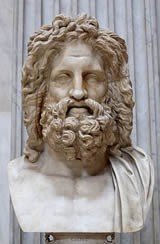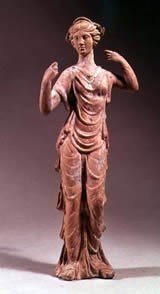Aphrodite
Aphrodite - All you ever needed to know!
As we know the word “Aphrodite” conjures up visions and emotions and often something different for everyone. If you study ancient mythology then it may be from a historic, timeless interest, if you have been married in Cyprus at Aphrodite Hills then it probably means something else and has a much more personal romantic meaning. With so much written about Aphrodite, we thought a definitive text may be appropriate. The history is richly recorded, but can be confusing so we have précised it and hopefully made it more readable.
In Roman mythology she is known as Venus and probably more famous, but in Greek she is Aphrodite, the goddess of beauty, pleasure, love and or course procreation, a natural progression from the former descriptions!
The procreation theme follows as she born when Cronus (a Titan) emasculated Uranus (the Sky god) and threw is genitals into the sea. Aphrodite arose from the sea foam and considered to be the daughter of Zeus (the top god) and Dione (considered an earth goddess).
So Aphrodite was born of great gods in a rather unusual manner. As was the way of the gods and mere mortals, Zeus became rather concerned over how beautiful she was and this desire for her caused instability amongst these warring gods and jealousy from the goddesses!
Not every father would wish his lovely daughter to marry the ugliest man in the kingdom, but Zeus ordered he match with Hephaestus, a rather deformed character with a wizened foot. The books are terribly clear on this as there was more than one Aphrodite and Hephaestus was also a son of Zeus (different mother). Whatever did happen, she was unfaithful (with many other gods, including Adonis, for whom she became a surrogate mother) and Hephaestus continued to make superb weapons and armour as he was smithy to the gods of Mount Olympus! He also made Aphrodite a wonderful golden girdle, which just added to her beauty! Her infidelity led to a number of children, but the records are again a little vague. This is all quite understandable as the whole god and goddess society were rather familiar with each other, unless they were warring!
The name Aphrodite is again interpreted and used in many ways and by many different mythologists and historians. She had many other names, for example Acidalia and Cerigo, The variations ion sects or followers in Greece used their own preferred names, but they all referred to the same god, Aphrodite, which led to her becoming the god of the people.
Her birth place is claimed to be in Cyprus and hence the well know Aphrodite Rock (the header image) and one of here other names chosen by certain followers was Cypris, “Lady of Cyprus”! Other would have you believe she was born close to Crete.
There are a multitude of connections across other mythologies and commonality of stories, from Roman and Phoenician to Egyptian, but all have similar threads. Aphrodite has been associated with the meaning “she comes at dusk” and would seem that is appropriate as she is closely associated with the evening star or the plant Venus!
There are many stories surrounding Aphrodite of course but all this all happened thousands of years ago much is lost in translation and Chinese whispers, but the stories are great nonetheless. For example in around 2 AD Aphrodite was jealous of the beauty of a mortal woman named Psyche. As a good friend of Eros and as he was the god of love (think Cupid, for Roman) she asked him to fire off a couple of golden arrows and get her to fall in love with the ugliest man on earth. Things didn’t quite go according to plan as Eros, pricked himself with his own arrow and fell in love with her! Psyche’s parent becamse involved and considered marriage to be against her best interests and send her off to see an Oracle, who bribded by Eros, arranged a regular assignation in a cave, where she found a lot of jewellery and finery for her. The odd thing is that the lights were always off as she had no idea who he was and the wings would have given it away! One can only assume that their love making was so passionate she just didn’t notice. Die to sister jealousy she lit a lamp one night and recognised him instantly and fled, with the words:
"Love cannot live where there is no trust!"
The sisters thinking Eros may now choose them (foolishly) hung around the cave, but Eros was having none of it and still heartbroken, they fell to their deaths at the base of the mountain.
Pysche (good name for this story) was distraught and wanted to find Eros, so she was advised to find Aphrodite, and get her blessing. Psyche found the temple to Aphrodite and entered it, whereupon Aphrodite set her some pretty difficult tasks to prove herself. She braved deadly golden sheep, river gods and any amount of pressure and came through, much the annoyance of Aphrodite! Aphrodite then claimed all this stress of children had meant she had lost some of her beauty to Hades and Pysche was to go and get it back! To cut a very long story short, involving, thinking of dying to get there, three headed dogs and barley cakes, she came through. Bringing the beauty box back, she naturally thought she could dip in and get some for herself, a kind of Eros “come on”. The box held a sleep “potion” which she succumbed to. Eros, the forgiving winged soul he was, flew to her body and wiped the sleep from her eyes. He then convinced Zeus and Aphrodite to wed Psyche. They agreed and Zeus made her immortal, which only seemed fair after her ordeals! Aphrodite danced at the wedding of Eros and Psyche.
Aphrodite was clearly a jealous god and was in awe and envy of Medusa and her sisters beauty, no doubt attracting too much of the male Greek gods attention! She grew so jealous; she cursed them according to one Greek myth changing Medusa’s hair for snakes and bestowed the stone-gaze curse upon her and her sisters as well.
Aphrodite also involved herself more than she should have with mortal heroes. When Jason (of Jason and the Argonauts) asked permission from the king of Colchis to remove the Golden Fleece he was clearly not very keen! So the goddess, Hera, who had agreed to subsidise the quest, asked Aphrodite for help. Unable to help herself she made the King's daughter, Medea, fall in love with Jason, who then helped the fleeces removal!
Add the cause of the Trojan War to her achievements and you can see she had influence that only comes with beauty and careful planning! This came about in the following fashion. Another god, Peleus was to be married to the sea-nymph, Thetis and all the gods were invited to the ceremony. Except Aphrodite! With her ability to manipulate and cause trouble she ensured a golden apple was placed on the banquet table. The fruit was inscribed: "For the fairest". Of course the egotistical goddesses began to argue the rightful possessor of this prize, as they all considered themselves the fairest.
As with all good arguments, the dispute went to arbitration (no doubt lawyers hadn’t been elevated to gods by this date). The judge was the most handsome mortal in the world, so he could clearly determine the judgement from a reasonable perspective. This turned out to be Trojan youth called Paris, (a shepherd). The three finalists: Aphrodite, Hera and Athena went to find him in the meadows where he was tending his flocks and to bribe him (of course).
- Hera, Queen of Olympus told him she would help him rule the world.
- Athena, goddess of war, said she would make him victorious in battle.
- Aphrodite cleverer than most and playing to the most basic of human nature offered him Helen, the most beautiful woman in the world, who happened, unfortunately to be married to the king of Sparta.
Aphrodite won the golden apple (obviously) and then she who helped him elope with Helen, who became Helen of Troy. Helen's husband and his brother gathered a Greek army to take his wife back, and so started the Trojan War.
The goddess of love is full of fun and energy and as we all know the path of true love is never easy! Come to Cyprus however and you may find love in person or just love of the location!
If you are looking for somewhere to stay then try Aphrodite Hills, it’s lovely, just as the lady was herself, but without the darker sides of this famous goddess’s nature! Named after Aphrodite and close to her birth place, it is tucked away within its own acreage and with lovely views and vistas, golf courses, a tennis academy, several restaurants and bars and a great range of accommodation, you won’t want to stay anywhere else!
Search Accommodation
Search Limassol Hotels, Bed & Breakfasts, Guest Houses and Self Catering Accommodation.
Upcoming Events
Select your preferred start date from the calendar to view events.
E-newsletter Signup
Sign up to our E-newsletter for latest events & offers:






